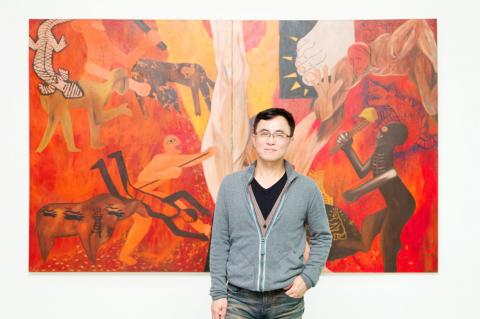An exhibition titled “Made in Taiwan: Yang Mao-lin, a Retrospective,” running until April 24 and featuring the works of artist Yang Mao-lin (楊茂林) at the Taipei Fine Arts Museum, featuring his works from the past 30 years that not only capture a multifaceted view of Taiwan’s political and social developments over the past three decades, but also form a veritable diary of the artist’s own progression and maturity.
Yang said that the term “made in Taiwan” symbolized the significance and uniqueness of Taiwanese products on the international market and the impact of European and US culture on Taiwan, while reflecting how Taiwan made its economic rise as the original equipment manufacturer of foreign firms.
The exhibition, which contains almost every piece of artwork Yang has produced with the exception of his earliest works, depicts Yang’s attempts to explore the possibility of using art and themes to express a critical view of Taiwan’s politics, history and culture, the museum said, adding that the exhibition has been divided into five sections that broadly categorize the themes and focus of Yang’s work into periods.

Photo courtesy of Taipei Fine Arts Museum
The collection includes paintings, sculptures and assembled works — almost every piece of art Yang created since 1983, the museum said.
His earlier works in the “National Epic” section, composed and painted during the Martial Law period, were strongly critical of the then-Chinese Nationalist Party (KMT) administration, while his later works were inspired by the influence on Taiwan of martial law being lifted, Taiwan’s rapid economic success and its connection to the rest of the world through trade, the museum said.
The exhibition’s five sections illustrate the changes to Yang’s technique and themes, retreating from his earlier criticism of authoritarian regimes in the “National Epic” section to his search for a historical identity in “Avant-Garde Epic,” then on to his use of cartoons and anime in an exploration of merging or clashing cultures in “Bad Taste,” the museum said.
The “Immortals” section embodies Yang’s attempts to move away from “traditional” two-dimensional art into sculptures, marking not only a watershed moment in his creative career, but also allowing him to further internalize and provide maturity to themes explored in “Bad Taste,” the museum said.
“Wonderland,” which features his most recent works, also sculptures, departs from the themes of social issues and living environment and moves toward a greater focus of himself, the museum said.
In that section, Yang, then just having entered his 50s, sought to express what is purely himself, a fulfillment of his desires and what he defines as his quintessential self, the museum said.
Commenting on the exhibit, Yang said that any artist would feel “happy and loved” to see work spanning half of their lifetime featured in a single exhibition, adding that he was especially moved when he saw his earlier paintings and drawings placed side-by-side with his more recent sculptures.
Museum curator Lin Ping (林平), who considers Yang to be one of the founding members of what is now considered the “Taipei School” of drawing, said that throughout his career as an artist, Yang has continuously challenged the times he lives in.

Taiwan would benefit from more integrated military strategies and deployments if the US and its allies treat the East China Sea, the Taiwan Strait and the South China Sea as a “single theater of operations,” a Taiwanese military expert said yesterday. Shen Ming-shih (沈明室), a researcher at the Institute for National Defense and Security Research, said he made the assessment after two Japanese military experts warned of emerging threats from China based on a drill conducted this month by the Chinese People’s Liberation Army’s (PLA) Eastern Theater Command. Japan Institute for National Fundamentals researcher Maki Nakagawa said the drill differed from the

‘WORSE THAN COMMUNISTS’: President William Lai has cracked down on his political enemies and has attempted to exterminate all opposition forces, the chairman said The legislature would motion for a presidential recall after May 20, Chinese Nationalist Party (KMT) Chairman Eric Chu (朱立倫) said yesterday at a protest themed “against green communists and dictatorship” in Taipei. Taiwan is supposed to be a peaceful homeland where people are united, but President William Lai (賴清德) has been polarizing and tearing apart society since his inauguration, Chu said. Lai must show his commitment to his job, otherwise a referendum could be initiated to recall him, he said. Democracy means the rule of the people, not the rule of the Democratic Progressive Party (DPP), but Lai has failed to fulfill his

A rally held by opposition parties yesterday demonstrates that Taiwan is a democratic country, President William Lai (賴清德) said yesterday, adding that if opposition parties really want to fight dictatorship, they should fight it on Tiananmen Square in Beijing. The Chinese Nationalist Party (KMT) held a protest with the theme “against green communists and dictatorship,” and was joined by the Taiwan People’s Party. Lai said the opposition parties are against what they called the “green communists,” but do not fight against the “Chinese communists,” adding that if they really want to fight dictatorship, they should go to the right place and face

A 79-year-old woman died today after being struck by a train at a level crossing in Taoyuan, police said. The woman, identified by her surname Wang (王), crossed the tracks even though the barriers were down in Jhongli District’s (中壢) Neili (內壢) area, the Taoyuan Branch of the Railway Police Bureau said. Surveillance footage showed that the railway barriers were lowered when Wang entered the crossing, but why she ventured onto the track remains under investigation, the police said. Police said they received a report of an incident at 6:41am involving local train No. 2133 that was heading from Keelung to Chiayi City. Investigators